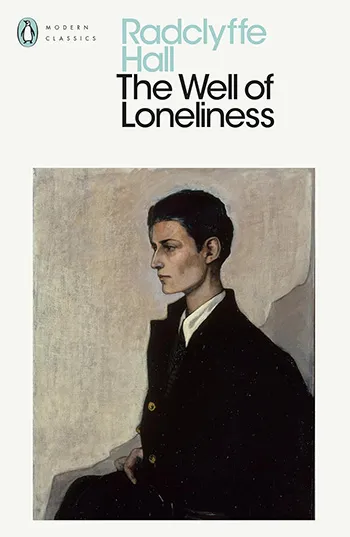
THE WELL OF LONELINESS
Radclyffe Hall
2022 Double 9 Books
© 2022
$0.99
548 pages
Content warning: Suicide, homophobia, racism, sexism
The Well of Loneliness by Radclyffe Hall is colloquially known as the first Lesbian novel. Even more colloquially, it's known as "that pile of miserable garbage." It's about 500 pages of meandering description, stilted prose, and stiff dialogue that mopes through the life of Stephen Gordon. Stephen is an intersectional icon for the ages: not only Gay but also racist and sexist.
This book leisurely wanders through a long stretch of Stephen's wealthy adolescence to her life in the war then as a lauded author who's hot, strong, and rich (can you tell a writer wrote this?). During the war, she meets a 17-year-old girl (Stephen is in her thirties), and they move together to Paris, where Stephen begins her writing career. Stephen comes to realize she'll never be able to give Mary the benefits of straightness, and so tricks her into thinking Stephen is cheating, so that Mary will ditch her for Stephen's ex-boyfriend (love a messy Queer love triangle!).
It's a difficult book to like. Hall attempts to establish common ground with straights through things like, "Look, I hate how miserable those other Queers are too" – although, as Caitlyn Jenner, Candace Owens, and innumerable others have taught us, it's a quick path to individual success: betray your own people and reap the rewards... until your own people are gone and your overlords still need bodies to keep their fires going.
The distaste Stephen has toward other Queers is also distinctly upper class. She has wealth, therefore she doesn't need community, other people, or to change. She just needs to be an Individual that's so Individual, the world will be forced to recognize her literary brilliance (again, can you tell a writer wrote this?).
At the end, Stephen appropriates the death of two of her Queer friends as fodder for her ascendence to genius. The ghosts of these dead Queers rise from their graves to beg her to be their Gay Jesus. It's up to Stephen to write books so good that they will cure straight prejudice just as surely as the royal touch. Truly, a book only a rich, white Queer could have written.
There are two possible readings of The Well of Loneliness. The first, as it's written, is that Stephen is a butch Lesbian who's ragingly sexist. The second is that Stephen is a Trans man in an era when that was unrecognized – who is also ragingly sexist.
Stephen succeeds in adopting all the trappings that her wealthy whiteness affords her. She is racist, she is homophobic. But where she is truly a genius of prejudice is in her perfect observance and replication of chauvinism. Stephen's relationship with her child bride, Mary Llewelyn, is, in a word, gross. Mary is constantly described as a girl and a child in need of Stephen's protection. Like the classic male protagonist, Stephen does not engage with Mary as an equal or someone capable of making her own decisions. Their dog, David, is written with more autonomy and character than Mary is.
Stephen, rather than engaging with Mary, tricks her and manipulates her "for her own good." It is somehow supposed to be seen as a martyr-like sacrifice that Stephen lies to and emotionally abuses the partner she supposedly loves.
I don't know why our society makes such a virtue of people (mostly men) being extremely bad communicators. It happens in nearly every supposedly heterosexual action movie (although I don't know how heterosexual a movie about men in butch drag fondling erect silver phalluses that jizz bullets can be). Put Stephen in a bat costume and she'd be a Nolan protagonist flouncing down dark alleys, muttering about how no one understands her, when she hasn't tried to explain herself a single time. Is this what Queer success is? To be as miserable as the straights?
Apparently this book was banned at the time. It was the first to show "inversion" as a thing that happens. Six years earlier, one of Hall's white-dude peers proposed that all Lesbians be executed. So Hall thought she was doing something positive, even if that something was really just reshuffling her place on the line to the chopping block.
That's the thing about books like this. It doesn't seem like it's arguing as much for universal change as for a self-interested "I'm one of the good ones." Hall is trying to place herself above "those other types" of inverts, the ones she calls "the miserable army." She'll be good, she pleads. She'll be just as prejudiced as any of the other white straights.

